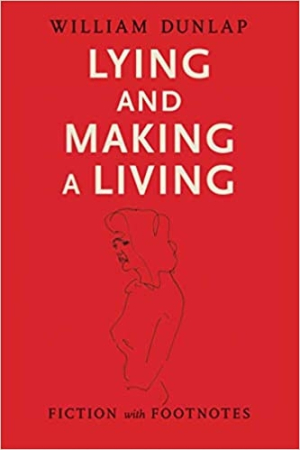It looks like you've stumbled upon a page meant to be read by our code instead of viewed directly. You're probably looking for this page.

Lying and Making a Living
Fiction with Footnotes
Lying and Making a Living is an eclectic short story collection whose tales represent a broad expression of human impulses across time.
Life is messy and confusing in William Dunlap’s short story collection Lying and Making a Living, which reaches from the period just after the Civil War into the 2020 election season.
Across thirty stories that are diverse in length and subject matter, the collection illuminates and pokes at the overwhelming complacency that marks everyday life. In them, adults and children seek out their fortunes, fall in and out of love, become disappointed and disenchanted, and engage in violent outbursts. By turns comfortable and uncomfortable, the collection makes the ordinary ups and downs of life compelling.
The book’s language shifts in skillful ways to accommodate each individual story. In the dialect-led “Tastes like Chicken–Circa 1956,” in which two groups of children, one white, the other Black, have different approaches to catching frogs in the bayou, the language helps to distinguish between the groups, illustrating the racial and economic divides of the times.
Clear and commanding language makes the various time periods of the stories come alive, though the book also leans into uncomfortable phrases and settings. Period-typical language is used to describe nonwhite people, including “savage” for Native Americans and “colored” for Black people, in stories set in the late-1800s. And “A Work in Progress,” about a writer and an attractive reader, and “The Third Encore,” in which a woman combs the internet, hoping not to see compromising photographs of herself, feature tasteless and off-putting language about sex and sex acts.
Set in 1867, the novella-length “Rufus and Sally by the Light of the Moon” develops its characters—Rufus, a cattle herder, and Sally, his companion—across several acts, as they escape a Comanche raid and take refuge in a nearby settlement, building separate lives. But indulgent narrative features—as with the settlement’s well-endowed donkey, and Sally’s trysts with local nuns—detract from the main story. Sally’s and the donkey’s contributions are minimal, which brings into sharp clarity Rufus’s obsession with her. This story also features multiple brief forays into the future of Rufus’s descendants, a device that is used in other stories as well; these diversions fail to advance their stories’ plots and feel indulgent.
The collection does not take itself too seriously, despite dealing with some serious topics. In “Vocabulary Words,” two men try to capture the feeling of discovering a cheating partner in one word. In the process, they conjure up various scenarios that describe the act without settling on any single word. “Writing for the Market,” in which a husband murders two of the men with whom his wife cheated, ends with a sardonic wondering at how the husband’s deceased parents would react to his imminent divorce, rather than his becoming a murderer. Different styles of humor come through for each story, but all are delivered with a dry, wry wit.
Many of the stories are flash-fiction lengths, but still introduce rounded characters in the space of sentences. That narrative speed is also present in the longer works, where characters and key plot points are established early in the story, allowing the developments to play out. Each story has a distinct trajectory, mood, and tone.
Demonstrating syntactical aplomb, Lying and Making a Living is an eclectic short story collection that eschews cohesion in favor of a broad expression of humanity across time.
Reviewed by
Dontaná McPherson-Joseph
Disclosure: This article is not an endorsement, but a review. The publisher of this book provided free copies of the book and paid a small fee to have their book reviewed by a professional reviewer. Foreword Reviews and Clarion Reviews make no guarantee that the publisher will receive a positive review. Foreword Magazine, Inc. is disclosing this in accordance with the Federal Trade Commission’s 16 CFR, Part 255.